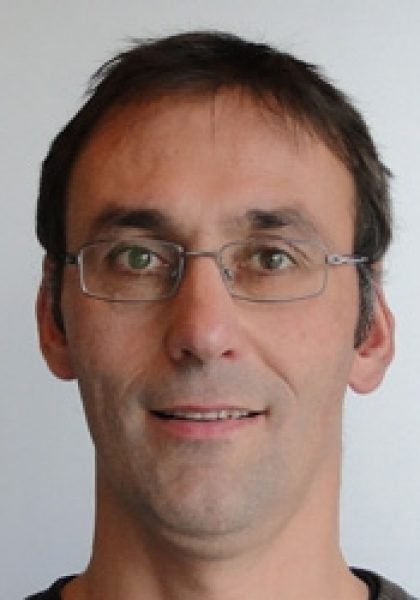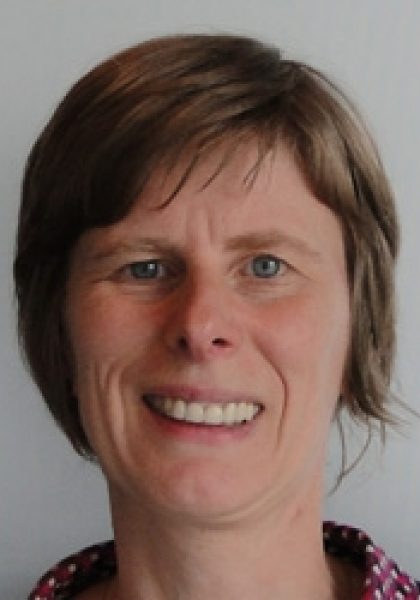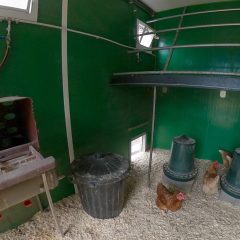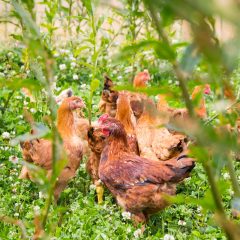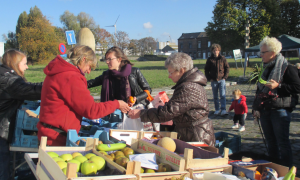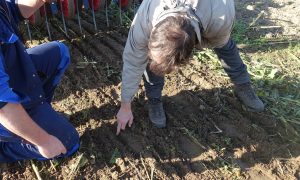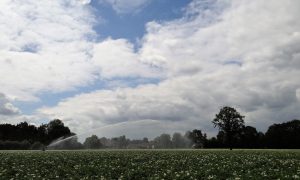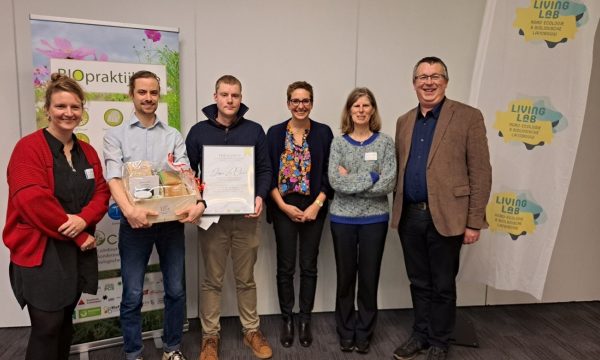Sector Organic agriculture
Organic growers, livestock farmers, their customers, and their suppliers will find an answer to the question “what can ILVO do for me?” here. You’ll get a brief overview of relevant expertise, analyses, infrastructure, and the professional approach that characterizes ILVO. You can contact the Agroecology and Organic Agriculture Living Lab (LLAEBIO) for questions regarding partnerships.
LLAEBIOQuick links
What does ILVO do?
-
Fertile soil is central to organic farming. ILVO tests the effects of combinations of measures, such as different fertilization forms, soil cultivation (e.g. tilling vs. no tilling), and groundcover management on soil quality, nutrient dynamics, and crop performance. Soil management is one of the spearheads of climate research at ILVO.
> More info about ILVO’s climate research: Center of Expertise for Agriculture and Climate
-
ILVO has a licensed composting site and makes its expertise in farm composting available to test centers and individual businesses. ILVO also conducts research into the composition, the process, and the quality of the end products of composting and fermentation of organic waste streams, including animal manure.
-
The organic sector is constantly looking for solutions to close nutrient cycles. ILVO conducts research into the supply and discharge of nutrients at plot level for various cultivation systems. In addition, ILVO examines how animal and plant production on farms or between farms can be integrated in order to close nutrient cycles (manure – feed) at a higher level.
-
An ounce of prevention is worth a pound of cure. ILVO’s Diagnostic Center for Plants explores the biological cycles of pests, mites, nematodes, viruses, bacteria, and fungi with the aim of finding solutions for sustainable control. The emphasis is on prevention, crop technical measures, and biological control. The latter includes the study of beneficial microorganisms and natural enemies, such as insects and entomopathogenic nematodes, for potential applications in integrated pest management (IPM).
In addition, ILVO develops resistance trials for new candidate cultivars and has breeding programs aimed at selecting cultivars with higher biotic and/or abiotic stress resistance.
> More info: Diagnostic Center for Plants
> Read about what ILVO does for arable farming and horticulture & ornamental cultivation
-
ILVO conducts research into the optimization of cultivation techniques for both ornamental plant cultivation and (organic) vegetable cultivation: judicious fertilization, soil cultivation, groundcover management, weed control, etc. An important instrument ILVO uses for this is innovative mechanization, such as robotization.
-
Technological developments are essential for the further optimization of production systems as well as making these more sustainable. ILVO takes the diversity of farms and the relatively small scale of organic farms in Flanders into account. The ILVO Agrifood Technology Living Lab, which focuses on the development of new technological innovations in the agrifood chain, responds to this by developing a ‘robot framework’ that is flexible and cost-efficient for small-scale growers. ILVO also has a fully equipped workshop and an experienced team to design, build, and evaluate prototypes for automation and robotization in a practical environment.
> More info: Living Lab Agrifood Technology
-
Animal welfare is of great importance in organic livestock farming. ILVO has a lot of expertise in research on the assessment, monitoring, and improvement of livestock welfare. This expertise is shared through, among others, the ILVO Livestock Living Lab.
> Read also what ILVO does for pig farming, poultry and rabbit farming, dairy farming and beef cattle farming
-
For organic livestock farming, it is important to use local raw materials in animal feed. But producing enough high-quality protein for animal feed locally is a challenge. ILVO investigates the nutritional value of local protein sources grown under organic conditions, as well as the performance of the animals fed on them and the quality of their final animal products.
> Read about what ILVO does for feed production, pig farming, poultry and rabbit farming, dairy farming and beef cattle farming
-
Functional agrobiodiversity (FAB) is all forms of biodiversity at the plot or landscape level that make a positive contribution to agriculture. This includes things like useful soil organisms, natural pest controllers, and pollinators. ILVO studies the interactions between the occurrence of these useful groups of organisms with land management and land use at the plot, farm, and landscape levels. ILVO also studies how this biological diversity can be better utilized, integrated, and managed on farms and in the landscape, with the aim of making (organic) agriculture less dependent on external inputs, such as crop protection products or fertilizers.
-
As coordinator of the Agroforestry Flanders Consortium, ILVO steers research, knowledge sharing, and business coaching in the field of agroforestry in Flanders. Effects at plot and farm level are studied and farmers are assisted with practical tools.
> Read more about Agroforestry
-
The four basic principles of organic farming are closely linked to the principles and practices of agroecology (NL). But production rules, marketing, and control procedures for agroecology are not laid down in a legislative framework like they are for organic products. Both communities are brought together in the Agroecology and Organic Farming Living Lab to share knowledge and facilitate cross-fertilization.
> More info: LLAEBIO (NL)
> Read more about Agroecology
-
ILVO strives for livelihood security and a more stable income for all links in the agrifood chain, through economic business and sector analysis, research into profitability, added value, market competition, organization of sales, consumer preferences, and the role of cities and municipalities. In order to convert the theoretical knowledge from the research into recommendations that provide support for business leaders, ILVO builds useful web applications and tools.
> Read more about: Business models
-
Food companies and on-farm food processors can contact the ILVO and Flanders’ FOOD experimental Food Pilot with questions concerning food processing, process and recipe development, and food safety, authenticity, and quality analyses. There is a specific subsidy channel for on-farm food processors, i.e. the ‘KRATOS innovation support for on-farm food processors’.
In addition, ILVO has specific research expertise in the valorization of residual flows released by various production systems, such as wet horticultural surpluses and used cultivation substrates.
> Read more about support for on-farm food processors: Food production
> Read more about the valorization of residual flows: Bioeconomy
How does ILVO work?
ILVO conducts research for the organic agriculture and horticulture sector through project operation and with its own resources. When setting up research and knowledge exchange activities for the organic sector, ILVO bases this on the specific questions and needs of parties in the agrifood sector. The parties are actively involved in all phases, from the development of the project idea to the research phase, and validating and implementing the results in practice.
Your point of contact: LLAEBIO
The Living Lab Agroecology and Organic Farming (LLAEBIO) wants to play an important role in facilitating new research projects, demo days, and workshops. It brings farmers, researchers, consultants, and other parties in the sector into contact with each other and starts working with them.
Your ILVO guarantee
- Scientifically-based solutions
- Individual and/or co-creative guidance for innovation trajectories
- Confidential treatment of your question
- Clear and easy-to-interpret results that are applicable to day-to-day operations
- Technological support for various farm processes
All ILVO expertises at your service
ILVO works in an interdisciplinary fashion and has a network of living labs that work closely together. A problem or question is therefore examined from many different angles by ILVO experts from different disciplines. This is guaranteed by ILVO's broad and systematic approach, together with the typical openness of the ILVO culture
Wide network
ILVO works well with organic (short-chain) practical businesses for specific field trials and for business support. For example, there is an exchange of organic manure and feed with a local, organic goat farm. In addition, ILVO is working with organic grower Felix de Bousies (PHAE business) and agricultural consultant and researcher Alain Peeters (RHEA) to build an agroecology pilot platform of 50 ha in Hansbeke.
These partnerships offer a lot of perspectives, both in the terms of experimental space and in the terms of knowledge building. In addition, ILVO uses the platform and the Living Lab to build a learning network on agroecology and organic agriculture in Flanders and abroad.
